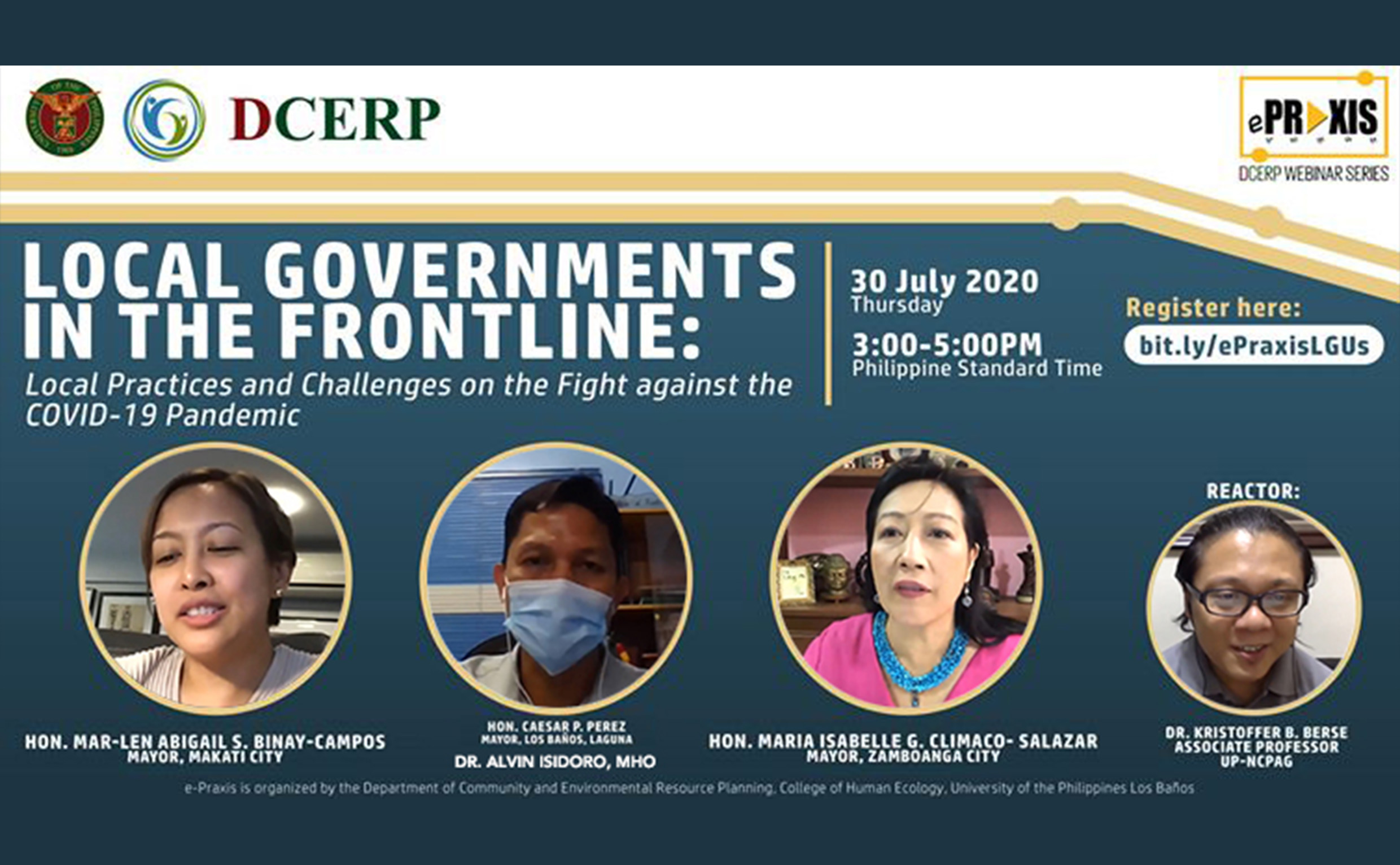
The local government units (LGUs) are the saving grace of the on-going fight against COVID-19.
This is according to Dr. Kristoffer Berse, an associate professor at the UP National College of Public Administration and Governance, after hearing the best practices of three LGUs during the webinar “Local governments in the frontline: local practices and challenges in the fight against the COVID-19 pandemic.”
“It is comforting and inspiring to see the efforts of the [LGUs],” said Dr. Berse. “This crisis will be won or lost in our communities, in our LGUs.”
The said webinar, organized by the Department of Community and Environmental Resource Planning of the College of Human Ecology (CHE-DCERP) on July 30, featured the initiatives and innovations of Makati City, Zamboanga City, and Los Baños, Laguna LGUs.
Aside from telling about the staple delivery of relief goods, contact tracing, testing, providing health and quarantine facilities, disinfection, information drive, and passing of relevant local legislations that are common among LGUs, the invited local officials presented their unique circumstances and solutions at these times.
Mayor Mar-Len Abigail “Abby” Binay-Campos of Makati City talked about how the country’s richest city has embraced technology to safely and efficiently distribute different kinds of financial assistance using the Makatizen Card and the Makatizen App.
She also presented other technology-oriented innovations and goods that the business capital has offered to its residents, such as the use of locally developed COVID-19 tracker, medical teleconsultations, online legal assistance, free Internet load for public school students, and laptops for teachers.
Mayor Binay, who earned her BS Human Ecology from the university and was named as UPLB’s outstanding alumna in 2017, stressed the importance of accurate data in disaster response and local planning.
“One thing that we learned in CHE, for you to be able to come up with an intelligent plan, data is very, very important,” she said. “Inaccurate data causes inefficient response to the constituents.”
Mayor Maria Isabelle “Beng” Climaco-Salazar of Zamboanga City also underscored the importance of data in local governance, as she also looked back in recovering from a past crisis, the Zamboanga Siege.
“Learning from the recovery planning in 2013, we recognize the importance of data for an evidence-based planning,” said Mayor Climaco, as she introduced the city’s COVID-19 Rehabilitation and Recovery Plan.
She also talked about the Centralized COVID-19 Data Center that the LGU uses to monitor the pandemic situation in Zamboanga City, the regional center of Zamboanga Peninsula and the gateway to Basilan, Sulu, and Tawi-Tawi, island provinces that the city helps these days.
“If we do not address the very basic health needs of Basilan, Sulu, and Tawi-Tawi, we will continue to bleed, to lose lives, and it will cost more because we will not be able to resolve the issues of insurgency, of terrorism,” she explained.
For his part, Dr. Alvin Isidoro, municipal health officer of Los Baños who represented Mayor Cesar Perez, acknowledged the volunteerism and assistance that the town has received from non-government organizations, and the role of the business sector and academe in the LGU-lead local COVID-19 task force.
The webinar is the second edition of the on-going CHE-DCERP’s e-Praxis knowledge sharing series.
UPLB has been featuring in its webinars the COVID-19 responses of different LGUs, such as the one by the College of Public Affairs and Development in June. (Mark Jayson E. Gloria)
(This was originally posted on the UP Los Baños website on September 7, 2020)
